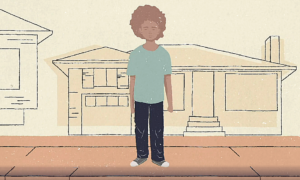Since 2008, federal law has required child welfare agencies to report on how they monitor psychiatric medication use in foster care. A directive in 2011 also required all states to spell out the steps they’re taking to curb over-reliance on medication.
Although there is no national data clearinghouse on these efforts, the Center for Health Care Strategies (CHCS), a New Jersey nonprofit resource center, has been monitoring reforms in a number of states. So far none has taken quite the comprehensive approach adopted by lawmakers in California, but some states have taken a leadership role in specific parts of the puzzle, according to Kamala D. Allen, the director of child health quality at CHCS.
“Washington and Massachusetts are two states that early on put in place second-opinion programs, making sure that primary care physicians had access to clinical expertise around prescribing issues,” Allen said. Other states have been outfront in monitoring medication use. “Oregon has been very heavy on the data collection and analysis,” she said.
In 2012 CHCS launched a three-year quality improvement project funded by the Annie E. Casey Foundation for six states (Illinois, New Jersey, New York, Oregon, Rhode Island and Vermont), and created a virtual learning collaborative,which provides online educational opportunities for agency staff members, supported by the Substance Abuse and Mental Health Services Administration, in which all 50 states were represented.
The March 2015 issue of Governing magazine reported at least 14 states now require prior authorization for at least some forms of psychiatric medications.
Here are some of the other initiatives states have adopted, according to CHCS, Governing, and the child advocacy organization First Focus, a national children’s advocacy organization:
Telephone Hotlines for Prescribers
Often, decisions about whether to prescribe psychiatric drugs are made by primary care physicians with no specialized knowledge about the risks and benefits of psychotropics. Recognizing the potential for misuse, Washington, D.C., and 28 states have established telephone hotlines staffed by behavioral health specialists who can provide information about medications and consult with prescribing physicians on a treatment decision. The consulting specialists are usually affiliated with research institutes and teaching hospitals. The National Network of Child Psychiatry Access Programs publishes a list of states:
- Connecticut: Child welfare workers, foster parents and treatment providers receive training on the risks/benefits of psychotropics, including side effects and possible treatment alternatives. A state psychiatrist reviews the child’s treatment history before approving a medication request and informs case workers and regional staff about the treatment decision. A centralized state office also analyzes and reports on prescribing patterns.
- Florida: Requires express and informed consent of a child’s parent or legal guardian before the state will pay for a psychotropic medication prescription.
- Illinois: Requires a second medical opinion for children receiving psychotropic medication. Appointed state child welfare services director to have final decision on whether to medicate a child. Contracts with the University of Illinois to provide independent medication review. Quarterly reports track utilization trends, monitor outlier prescribing and review high-risk children and youth.
- Kentucky: Launched an initiative to better monitor prescriptions among Medicaid recipients. Considering a second-opinion review of psychotropic prescriptions.
- Maryland: Requires monitoring appointments with doctors before authorizing a psychotropic prescription refill.
- New Jersey: Requires a second medical opinion for children receiving psychotropic medication. Requires consent of parents whose rights have not been terminated. Created a targeted, individualized psychiatric care plan, including in-home services for foster youth.
- New York: Launched a multi-agency effort to explore data analysis collection practices for the oversight of psychotropic medications. Also developing the framework to improve monitoring through comprehensive Medicaid redesign.
- Ohio: Analyzes prescribing data to identify outliers. Developed training and learning modules online for those prescribers and requires regional program managers educate them about alternative treatments.
- Oregon: Requires child welfare agencies to produce quarterly reports on the number of children receiving psychiatric medications, including the number aged 5 and younger, and the number receiving multiple medications. A second opinion is required before prescribing an antipsychotic.
- Texas: Provides training on the risks and benefits of psychotropics, including side effects and treatment alternatives, to child welfare workers, foster parents and treatment providers. Issued guidelines on dosage, screenings and diagnoses and required managed-care plans to review cases which fall outside specified parameters.
- Washington: Requires a second medical opinion by a psychiatrist for all children receiving antipsychotic medication. Instituted a third-party psychotropic review program.
- Wyoming: Requires a second medical opinion for children receiving psychotropic medication.
Most state reforms have focused on monitoring, oversight and strategies to reduce prescription numbers and their dosages, according to Shadi Houshyar, the vice president for child welfare policy at First Focus. “What’s been more challenging for states, and where we’ve seen less progress, is moving away from medication in favor of evidence-based behavioral therapies for children,” she said.
That approach usually requires more coordination of child welfare and health care services to improve the quality of care. For example, both Arizona and Texas have created a single Medicaid health plan for all their children in foster care, according to Houshyar. Michigan provides incentive payments to community mental health agencies to serve foster kids through the Medicaid behavioral-health managed-care system, she said. And both New Jersey and Utah have embedded health care providers in their child welfare offices to improve the coordination of care. “That’s the next step,” said Houshyar, “collaboration between the two systems — Medicaid and child welfare — to expand the availability of evidence-based treatments.”
Back to main article “California Lawmakers Approve Plan to Tackle Misuse of Psychiatric Meds”






























